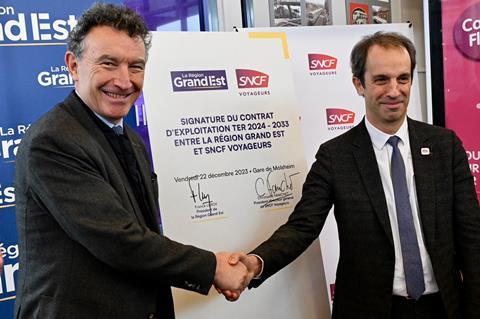
FRANCE: National operator SNCF and the Grand Est région have signed an ‘ambitious and innovative’ 10-year agreement covering the development of local and regional rail services in and around Strasbourg.
Signed by SNCF Voyageurs President & Director-General Christophe Fanichet and Region President Franck Leroy in the recently modernised station at Molsheim on December 22, the contract provides for €1bn to be invested over the next 10 years. This covers modernisation of the TER rolling stock fleet, including acquisition of new trains. A further €200m will be spent on improvements to rail services and infrastructure.
A key element in the 2024-33 contract is the introduction of more frequent trains on selected routes, the number of weekday services having increased from 1 530 in 2016 to 1 891 in 2023.
Service quality will be improved with the launch of a stricter punctuality measure requiring trains to run within 2 min 59 sec of the timetable rather than the 5 min 59 sec requirement that had applied until now. To help meet the tougher criteria, the région will invest €10m over the next few months on acquiring spare trainsets and upgrading maintenance equipment to reduce downtime.
The financial arrangements between the région and SNCF will be changed so that fares revenue is paid directly to the local authority, which will reimburse SNCF Voyageurs for its costs, taking fluctuating energy and raw materials prices into account. Payments to SNCF Voyageurs will also reflect service quality with an arrangement of bonuses and penalty fees.
Over the length of the contract period, Grand Est plans to open up services progressively to competition. To ensure uniform service standards, SNCF Voyageurs will initially be tasked with ticket sales and integration of all routes, with responsibility for passenger information and customer relations.
Leroy called for the région to be ‘a model of sustainability’, noting that the contract ‘changes the rules for the benefit of users’. He was confident that local residents would switch to public transport as quality improved, helping to reduce the carbon footprint in the area.
Fanichet took the opportunity to thank local staff for their commitment, acknowledging that the région has ‘bold ambitions for rail and for passengers to which we will be keen to respond’.
Among improvements during the 2017-23 contact period, the région introduced regular-interval services in Lorraine and a half-hourly all-day service between Strasbourg, Colmar and Mulhouse. Additional trains were launched on the Reims – Charleville-Mézières route and daily Paris – Troyes services were increased from 13 to 15 each way with four extended to and from Mulhouse. Regular-interval services were launched in and around Reims and the Épinal – Saint-Dié-des Vosges route was reopened with 10 weekday return trips on weekdays, with between five and eight at weekends.
- Grand Est région has welcomed the Senate’s decision in November 2023 to support reinstatement of two through trains a day each way between Metz, Nancy and Lyon. This Train d’Équilibre du Territoire service is to start in late 2024 or early 2025; the link had been withdrawn in 2018 because of engineering work at Lyon Part-Dieu. The région will contribute towards the cost until 2028-29, after which the national government will assume financial responsibility. Four Coradia Liner trainsets will be made temporarily available by the région, after which new rolling stock is envisaged.

















